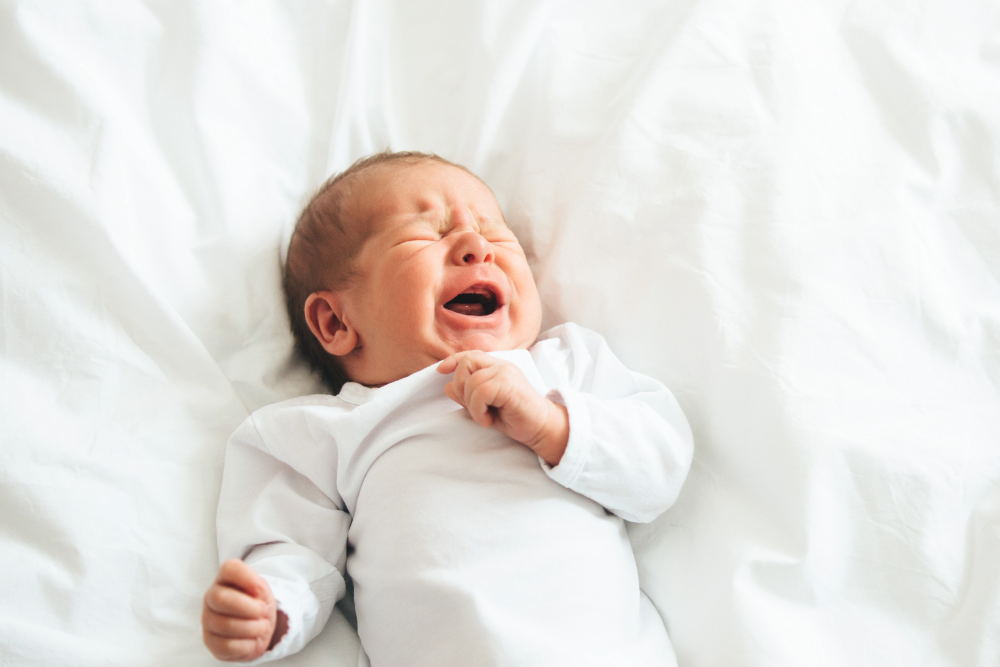
Baby cries in his sleep: causes, meaning and what you can do
When your baby cries in their sleep, it can be initially unsettling—especially for new parents. Many people wonder: Why is my baby crying in their sleep even though they're not awake? Is this normal? Is they in pain or having a bad dream? Should I wake them up or let them sleep?
The good news: In most cases, it's completely normal for a baby to cry or make noises in their sleep. A baby's sleep is very different from adult sleep , and crying is a natural part of their development. Nevertheless, it's important to take a closer look to understand the causes and respond appropriately.
In this article we explain to you:
-
Why babies cry in their sleep
-
What causes may be behind this
-
When you should intervene – and when not
-
What you can do to help your baby sleep more peacefully
Why do babies cry in their sleep? – A brief overview
Babies process many of the day's impressions while they sleep. Unlike adults, they are more often in a so-called REM (rapid eye movement) sleep phase , during which the brain is active – processing dreams, stimuli, and emotions.
During this phase, it is normal for babies to:
-
moan or smack,
-
twitch your arms,
-
cry or moan,
-
open your eyes briefly – and then go back to sleep.
Important:
Not every cry means your baby is awake or unhappy. Often, they cry semi-consciously in their sleep, without actually needing to be disturbed.
Causes: Why does my baby cry in his sleep?
1. Immature sleep cycle
Newborns don't yet have stable sleep phases. The transition from light to deep sleep is often uneven. During this transition, the baby may cry or groan briefly.
2. Processing of stimuli
Babies take in an incredible amount of information during the day: sounds, light, people, smells. This information must be processed during sleep – which can lead to restlessness and crying.
3. Crying phase (regulatory disorder)
In the first three months of life, many babies have a so-called “ crying phase ” in which they are restless for seemingly no reason – even when they are sleeping.
4. Dreams
Even though research has not yet been able to conclusively determine whether babies really dream, they react during REM sleep with facial expressions and sounds – possibly even crying.
5. Stomach ache or digestive problems
A very common reason for crying at night is the famous stomach ache:
-
Air in the stomach (colic)
-
Immature digestive system
-
Bloating or reflux
6. Teeth
When teeth come in or erupt, it causes discomfort – even while sleeping. Many babies cry restlessly, turn around, or chew their teeth.
7. Developmental spurts
Babies make many mental and physical leaps in the first months of life—known as growth or development spurts (e.g., from the book "Oh No, I'm Growing"). These can greatly impact sleep.
8. Hunger or thirst
Sometimes hunger is first announced by crying while half asleep – before the baby really wakes up.
9. Separation anxiety
From the sixth month onwards, babies begin to become more aware of their surroundings. At night, they may become afraid that mom or dad is no longer there—which manifests itself in crying.
10. Uncomfortable sleeping environment
A sleeping bag that is too warm, disturbing noises, a full diaper or uncomfortable clothing can also cause a baby to become restless and cry while sleeping.
Should I wake my baby if he cries in his sleep?
Not necessarily. Many babies cry or whimper in their sleep and calm themselves down. It's important to observe your baby's behavior carefully:
When NOT to wake up:
-
When the baby has closed his eyes
-
If it sobs or moans briefly
-
When it calms itself down again
🕊️ In such cases, it's often better not to intervene. Many babies need this moment to fall asleep on their own.
When you should react:
-
When the baby opens its eyes and is clearly uncomfortable
-
If it does not calm down within a few minutes
-
If you suspect pain, illness or fever
-
If the crying sounds shrill or unusual
🍼 Breastfeeding or cuddling can help in such cases – pay attention to your gut feeling.
What you can do: Tips for quieter nights
1. Create a peaceful sleeping environment
-
Dark, quiet room
-
Sleep rituals (e.g. singing, reading aloud, stroking)
-
Consistent rhythm
2. Respond to needs – but not immediately
If your baby cries, wait a few seconds before picking them up. Some babies self-regulate. Others need your closeness. Observe what helps your child.
3. Comfortable sleeping position and clothing
-
Supine position is recommended (to prevent sudden infant death syndrome)
-
Sleeping bag instead of blanket (suitable for room temperature)
-
No annoying labels or too tight cuffs
4. Gentle calming techniques
-
Quiet humming or singing
-
Stroking the head or back
-
White noise (e.g. via app or device)
5. Baby carrier during the day
Babies who are carried a lot during the day often sleep more peacefully because they experience more closeness and regulation.
6. Support digestion
If your baby is prone to gas:
-
Burping after every meal
-
gentle abdominal massages (e.g. clockwise)
-
warm cherry stone pillows
When should you see a pediatrician?
Crying in your sleep is usually harmless . But there are exceptions where you should consult a doctor to be on the safe side:
-
Fever, diarrhea or vomiting combined with crying
-
Unusual posture or muscle cramps
-
Crying accompanied by shortness of breath or skin discoloration
-
Sudden extreme restlessness in an otherwise calm baby
-
You yourself have a bad feeling
🩺 Trust your instincts. You know your baby best—and if you're worried, a medical check-up is never a bad idea.
Baby cries in sleep according to age – what is normal?
Newborns (0–3 months):
-
Very restless sleep
-
Crying often due to overstimulation or colic
-
REM sleep is dominant
4–6 months:
-
Sleep rhythm develops
-
Developmental spurts can trigger crying
-
Separation anxiety begins slowly
6–12 months:
-
Teeth, mobility, new awareness
-
Increased crying possible
-
Often afraid of being alone
From 1 year:
-
Dreams, nightmares, first awareness of “I”
-
Night terrors (Pavor nocturnus) possible
Baby cries in sleep – nightmare or night terror?
Nightmares:
-
Often from about 12 months
-
Baby wakes up, cries, seeks closeness
-
Can be calmed down
Night terrors:
-
Usually between 1 and 6 years
-
Baby suddenly cries loudly but is “unresponsive”
-
Eyes open, but sleeping deeply
-
No remembering the next day
🧘♀️ What to do if you have a night terror?
-
Do not wake
-
Stay close
-
Stay gentle and calm
-
After a few minutes the attack usually ends on its own
What does research say?
Studies show that babies need time to regulate themselves. Sleep and emotional development go hand in hand. Crying in their sleep is part of the maturation of the nervous system.
Attachment also plays an important role: Babies who feel securely attached can calm themselves more easily over time – but this is not a competition , but a process that can take months or years.
Conclusion: Baby cries in sleep – mostly harmless, but watch carefully
If your baby cries in their sleep, it's usually nothing to worry about. It's part of their development, sleep maturation, and processing of impressions. Nevertheless, you should remain attentive and learn to understand your child's signals .
🔑 The most important points at a glance:
-
Crying in sleep is often normal – especially in the first months of life
-
Many babies regulate themselves – sometimes just waiting helps
-
You should keep an eye on physical causes (e.g. teeth, stomach ache)
-
Rituals, closeness and peace help your baby sleep better
-
If you are unsure or notice unusual behavior, it is better to see a doctor again
Your baby needs one thing above all: loving companionship – even (and especially) during restless nights.


